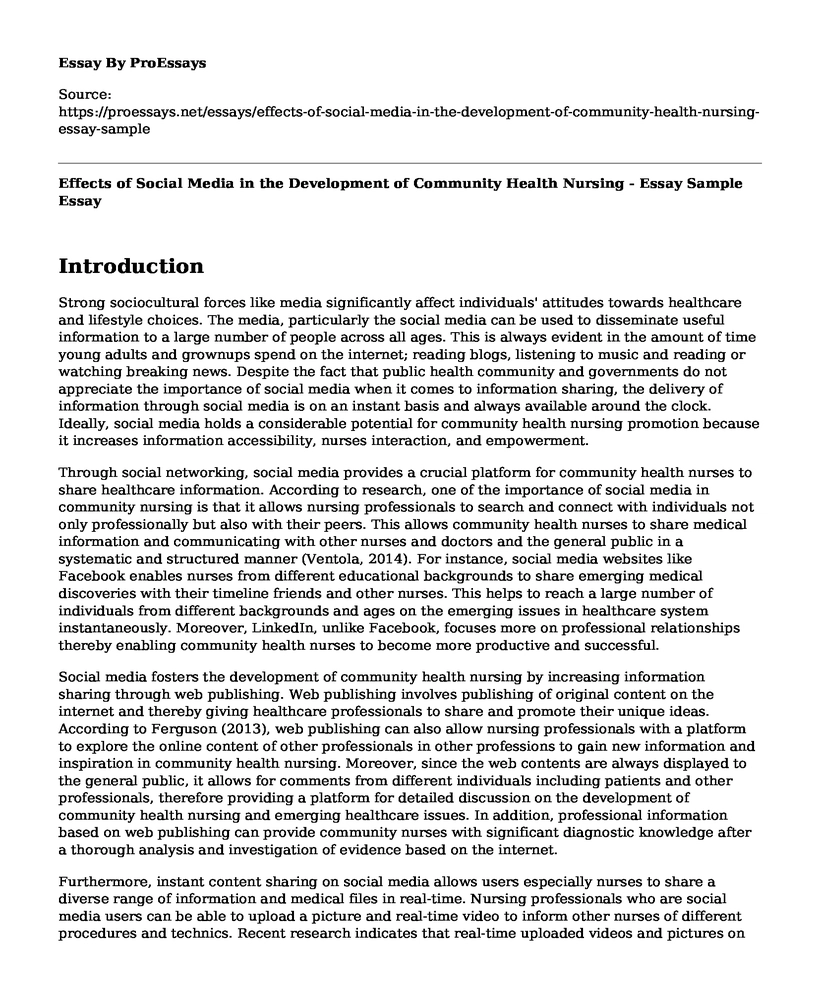Introduction
Strong sociocultural forces like media significantly affect individuals' attitudes towards healthcare and lifestyle choices. The media, particularly the social media can be used to disseminate useful information to a large number of people across all ages. This is always evident in the amount of time young adults and grownups spend on the internet; reading blogs, listening to music and reading or watching breaking news. Despite the fact that public health community and governments do not appreciate the importance of social media when it comes to information sharing, the delivery of information through social media is on an instant basis and always available around the clock. Ideally, social media holds a considerable potential for community health nursing promotion because it increases information accessibility, nurses interaction, and empowerment.
Through social networking, social media provides a crucial platform for community health nurses to share healthcare information. According to research, one of the importance of social media in community nursing is that it allows nursing professionals to search and connect with individuals not only professionally but also with their peers. This allows community health nurses to share medical information and communicating with other nurses and doctors and the general public in a systematic and structured manner (Ventola, 2014). For instance, social media websites like Facebook enables nurses from different educational backgrounds to share emerging medical discoveries with their timeline friends and other nurses. This helps to reach a large number of individuals from different backgrounds and ages on the emerging issues in healthcare system instantaneously. Moreover, LinkedIn, unlike Facebook, focuses more on professional relationships thereby enabling community health nurses to become more productive and successful.
Social media fosters the development of community health nursing by increasing information sharing through web publishing. Web publishing involves publishing of original content on the internet and thereby giving healthcare professionals to share and promote their unique ideas. According to Ferguson (2013), web publishing can also allow nursing professionals with a platform to explore the online content of other professionals in other professions to gain new information and inspiration in community health nursing. Moreover, since the web contents are always displayed to the general public, it allows for comments from different individuals including patients and other professionals, therefore providing a platform for detailed discussion on the development of community health nursing and emerging healthcare issues. In addition, professional information based on web publishing can provide community nurses with significant diagnostic knowledge after a thorough analysis and investigation of evidence based on the internet.
Furthermore, instant content sharing on social media allows users especially nurses to share a diverse range of information and medical files in real-time. Nursing professionals who are social media users can be able to upload a picture and real-time video to inform other nurses of different procedures and technics. Recent research indicates that real-time uploaded videos and pictures on sharing interfaces like YouTube or WhatsApp groups often attract discussions through comments which can be used to inform and inspire millions of community health nurses and patients around the world (Casella, Mills & Usher, 2014). Similarly, social media also provides a platform for work collaboration by allowing community nurses with social media accounts to work together despite thousands of miles.
Conclusion
In conclusion, social media is an ideal tool for the development of community health nursing due to increased information sharing, professional interaction, and empowerment. As evidence suggests, through social networking and content sharing, community nurses are able to get credible medical information and improve work collaboration over thousands of miles. Moreover, web publishing gives community nurses a platform to share and promote their unique ideas.
References
Casella, E., Mills, J., & Usher, K. (2014). Social media and nursing practice: changing the balance between the social and technical aspects of work. Collegian, 21(2), 121-126.
Ferguson, C. (2013). It's time for the nursing profession to leverage social media. Journal of Advanced Nursing, 69(4), 745-747.
Ventola, C. L. (2014). Social media and health care professionals: benefits, risks, and best practices. Pharmacy and Therapeutics, 39(7), 491.
Cite this page
Effects of Social Media in the Development of Community Health Nursing - Essay Sample. (2022, Jul 17). Retrieved from https://proessays.net/essays/effects-of-social-media-in-the-development-of-community-health-nursing-essay-sample
If you are the original author of this essay and no longer wish to have it published on the ProEssays website, please click below to request its removal:
- Emergency Management COOP Analysis
- Judges Threaten to Shut Taj Mahal Article Analysis Paper Example
- Essay Sample on Mixed Anxiety/Depression & Substance Use: Effective Diagnosis & Treatment
- Movie Analysis Essay on Giants and Toys: The Rise of Corporate Idol Culture in 1950s Japan
- Essay on Long Day's Journey: A Family's Struggles & Resentments
- Essential Workers: Key Players in Coronavirus Crisis - Essay Sample
- Celebrity Culture - Free Essay Sample







